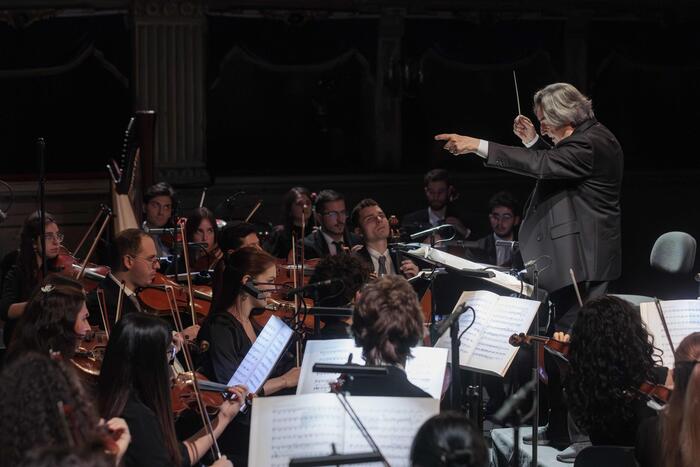(by Elisabetta Stefanelli)
First the strings, deep bass, for Schubert's Incompiuta with all its poignant melancholy, then in the second part a symphony that transmits all the anguish of broken lives and the violence, with the drum, the winds sometimes so similar to the machine guns in Symphony No.
9 by Schuman, performed for the first time in Italy.
On the day of the eightieth anniversary of the Fosse Ardeatine massacre, on Palm Sunday, with the world in a spiral of violence and the day after the death of his friend Maurizio Pollini, maestro Riccardo Muti takes the stage in the Santa Cecilia hall of 'Music Park Auditorium with a great load of emotion.
In front of him the young people of the Cherubini Orchestra, who are joined by the instrumentalists of the Carabinieri Band, who do not lose their enthusiasm and lift him up on a dark day.
''William Schuman's Symphony No. 9 expresses a dramatic mood for a terrifying tragedy, incomprehensible to the human mind,'' says Riccardo Muti during a pause in the rehearsals.
''In the various celebrations and memories that we have made of the massacre over the years - adds Muti - the meaning does not diminish but in some way the tension loosens.
However, when I was in Chicago and I received this score, written by the Pulitzer Prize winner for music, I felt all the rebellion for such cruelty and immediately wanted to perform it''.
It was 2019 and on the occasion of the 75th anniversary of the massacre Muti conducted the Chicago Symphony Orchestra in William Schuman's Symphony No. 9, which today arrives in Italy for the first time.
''The title is in Italian, 'Fosse Ardeatine' because he couldn't translate it, it's impossible to translate the meaning of 'fossa', it doesn't have the same impact.
In Chicago it was a great success, and the President of the Republic wrote to me,'' says the maestro.
The symphony had been created in the late 1960s when Schuman, who was from a Jewish family, visited the memorial and was impressed.
''We need to come to terms with the past to build the future - the composer said in this regard - but in this work I am the enemy of oblivion''.
''Why was it never performed before?
Schuman was outside the parapolitical tendencies of music, he was an artist who wrote out of internal necessity,'' says Muti.
''It is an extremely emotional piece with strong moments such as the strings at the end, the instruments that disturb, the silent pain that emerges, and the ending in which the bell appears, which is not Dante's, it does not ring from afar, it is violent and it seems that humanity will die in the final earthquake''.
The maestro does not hide the terrible similarities with today: ''this music traces a tragedy that is repeating itself again, in a violent, unexpected way.
In a way I don't dare paint.
The young people, those who are here, of the Cherubini orchestra, are a hope.
You hear, and they hear it, in the sounds what the composer wanted to say for the future''.
A warning on a day then darkened for maestro Muti by the death of Maurizio Pollini.
''I saw that beautiful photo we had taken together, in which I accompany him off stage'', he says while recalling their first concert together ''in 1972, at the Berlin Philharmonic'', and the last at the Ravenna festival in 2019', he says emotionally.
''He was a person who dedicated his life to music in a sublime way''.
Something suspended, like Schubert's L'incompiuta which he chose to open the concert.
''I thought it was perfect, it is a secular prayer, full of a lucid melancholy that fits very well with the suffering of the tragic tumult of the Fosse Ardeatine''.
Reproduction reserved © Copyright ANSA

